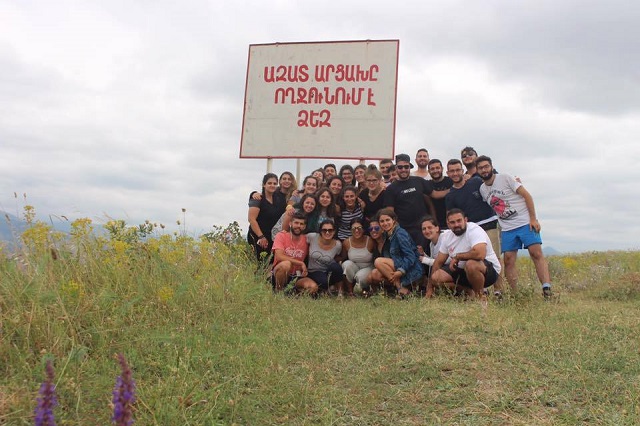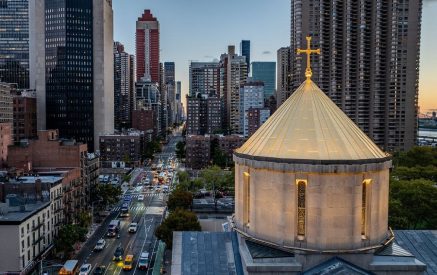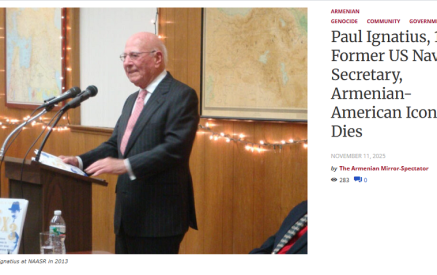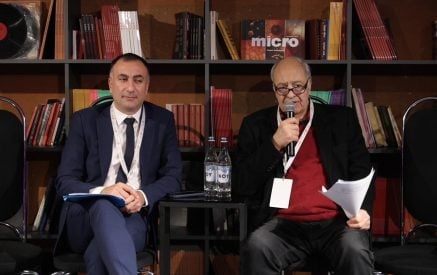The Armenian Weekly. Last week we discussed the imperative of integrating the diaspora and Armenia in the context of leadership. From a practical perspective, the talent pool for the critical challenges is much larger and deeper…if we have the will to address the obstacles. The will encompasses a more inclusive vision for Armenia by having the courage to subordinate power plays, egos and pseudo-ideological nonsense. When survival is at stake, patriotism is the only ideology. The success of this “top down” approach to this vision will be based on the resolve of the government infrastructure and its opponents. In parallel, we must dramatically strengthen the relationship of the people of the diaspora and the homeland.
When survival is at stake, patriotism is the only ideology.
Why is this important? Those with the resources, authority and influence are clearly a necessity for success. Their absence will diminish the probability of our collective success. At the base of the pyramid, however, are the thousands of relationships that are the outcome of our work together. One drives a vision with leadership, while the other changes the culture. Both are required. My own experience may offer some value.
Many years ago, I anticipated my first trip to Armenia with incredible emotion. For decades, I listened to our family elders, read many volumes and taught the next generation. Still, there was a void as I had never touched the soil of the homeland. The trip itself was a dream come true, but honestly I felt something was missing. At that time given our lack of familiarity, we chose to sign up with an American-based tour group. Despite the fact that our group was small (less than a dozen), I found it to be unimaginative by being overly focused on buildings and monuments. The excitement began to wear off as we visited our tenth church. During some free time, I wandered around Yerevan and discovered what I was missing. The tours, by design, limit interaction with the people. With due respect to our history, the most important asset of Armenia will always be its people: the seniors, the youth, the city dwellers and the village folks. We were able to arrange some activities outside the tour that brought us into contact with many of the common citizens. It was at that point that I truly fell in love with Armenia. Like many, we went on to find our niche to become a part of the homeland. Our identity today is sustained by the people we have met, worked with and are honored to call our friends. They are a part of our lives. The human element established a bond that cements and enables our continued commitment. Those experiences have convinced me that the future of diaspora/Armenia relations must be based on viable leadership models and an expansion of the common relationships. I believe that giving money to Armenia is a noble gesture, but we are called upon to do more. Instead of writing checks and feeling uncertain as to what the impact has been by satisfying an obligation, go to Armenia and build a relationship with the people that are impacted by your generosity. Find new friendships and satisfaction by directly connecting with the village, the NGOs, schools or other beneficiaries. It will lead you down a path of fulfillment you can only imagine. In addition, you are removing one more brick from the wall that has limited our diaspora’s relationship with the homeland.
Read also
We must invest in massive youth exchange programs at multiple levels. We have made a good start with service programs and camps, but they must be expanded both in participation and breadth. For example, our educational and philanthropic groups should institute middle school and high school exchange programs where diaspora youth can attend school in Armenia and vice versa. In addition to educational experience, socialization will build bonds for a lifetime. Camps and internships should be expanded so that thousands of youth connect each year. We have the financial resources to make this happen if we choose to make it a priority. We have many problems, but investing in the future should be at the top of everyone’s list. Many of our leaders need to think bigger and remove their fear of failure. Investing in this manner will address two challenges in parallel: the diaspora youth will build an emotional connection with their heritage that will sustain their growth, and Armenia will benefit in numerous ways from the influx of innovative resources. A comparable program for professionals must also be established. It is not enough to rely on the goodwill of individuals to volunteer. This is beautiful and inspiring but not adequate. The medical profession has led the way thus far with doctors, nurses and other diaspora resources contributing. A collaborative effort at the highest level of the government with professional groups in the diaspora can expand this effort. Sabbaticals and leaves in addition to corporate support can be applied to Armenia’s needs. There are multiple disciplines such as education, engineering, defense development, diplomacy, intelligence and others that could usher in incredible resources to help meet established goals. Each one of these individual connections will further the cause of building one nation from the ground up and top down.
One of the issues that is striking to even a casual observer in Armenia is the vast difference between the urban landscape of Yerevan (about one-third of the population) and the rural communities. There is very little “suburban” sprawl in Armenia. Once you leave the city, you transition quickly to small towns and villages. Vestiges of the economic collapse are everywhere with abandoned factories and unfinished homes. Yerevan is a modern European-type city with a quality of life to satisfy culture, education and socialization. There are challenges, of course, as in any large city but it is safe and exciting. The rural areas, for the most part, are bearing the brunt of the poverty statistics and struggles of Armenia. It is for this reason that a few years ago our family chose to do what we can with border rural villages. Certainly the need was a major motivator, but the quality of the people we have met is literally a life-changer. Our work together has resulted in building school infrastructure and equipping the needs of the primary and secondary schools. Additional projects for the exterior grounds and economic opportunities are in the planning stages, but the friendships we have made and their impact on our lives has been rewarding. These wonderful people experience the joy in life without material surrogates. They understand the value of human relationships, interdependency and creativity. It requires a sincere desire on our part to build friendships. We are there to listen and help. There is a difference between charity and participating in something you build together. Finding that difference enables a joyful benefit. As individuals our lives are enhanced; collectively the diaspora and Armenia become one step closer to oneness.
A new model is emerging that is in its infancy and needs support from both ends of the pyramid. Imagine the possibilities if more diaspora families invested in building relationships with those who are the beneficiaries of their generosity. Through these face-to-face partnerships, new possibilities emerge as the diasporans become a valued part of the community. This is the difference between outside visitors and compatriots. Our family feels like a part of the Paruyr Sevak community because our common work has enabled a communal partnership. When we visit the village, we feel the love and respect that sustains our relationships. This is an approach that we are grateful to have discovered through organizations like the Armenia Tree Project (ATP) and the Paros Foundation. It can happen in hundreds of locations in Armenia through a variety of organizations that serve as introductory catalysts. What happens beyond that is up to all of us. For those Armenians from the diaspora who are contributing financially yet feeling the uncertainty of how their benevolence has helped, this offers a very rewarding option. It is by knowing the people that we truly feel satisfaction. It is for this reason that we will continue to advocate for a broader investment vision that includes knowing the people of these communities. There is no doubt in our minds that this will accelerate the prosperity of Armenia and bring incredible joy to your hearts.
Our vision for the future must include practical game-changers that will inspire others. Often we articulate direction that is either too vague or contains strategies that are difficult to implement. Investing in massive youth programs, professional exchanges and communal partnerships are united in their connection to people and the resulting relationships. When diaspora Armenians and citizens of the homeland build sustainable friendships—real relationships where we are a part of each other’s lives—the bonds of an integrated nation are built from the bottom up. This is how we can change the culture that limits our potential. If we go back a little over 100 years, most of us were part of the indigenous population. Those in the west were murdered or fled, the descendants of whom we call the diaspora. Those in the east received some of the survivors, fought for their survival and established the homeland we have today. Despite the cultural impact of host nations, we remain one in our hearts. The response of the diaspora to the homeland is a clear indicator. It is time to remove the walls that artificially separate our nation. This is not a statement of mass repatriation. That is, and will always be, an individual choice. Our direction must be to enable a vision that energizes the potential of all Armenians, diaspora and homeland, to sustain our civilization. That belief in sustainability is what truly unites us.


























































